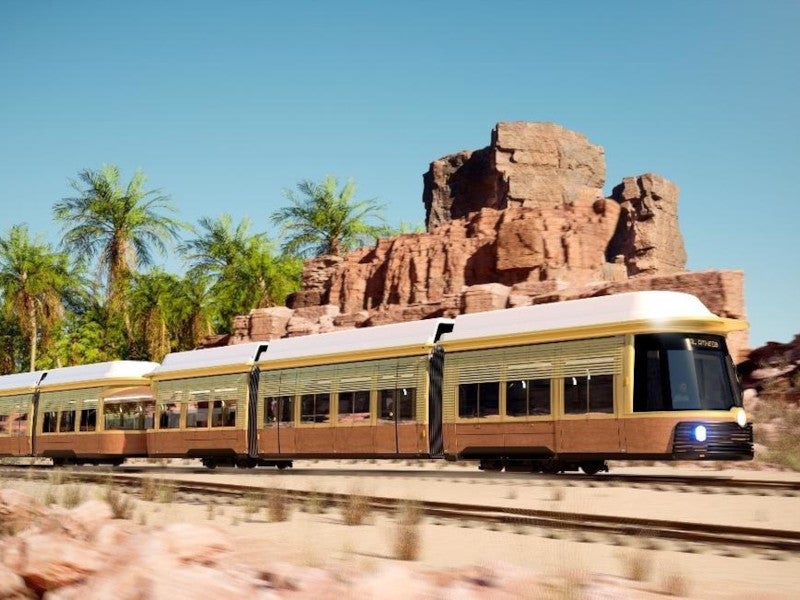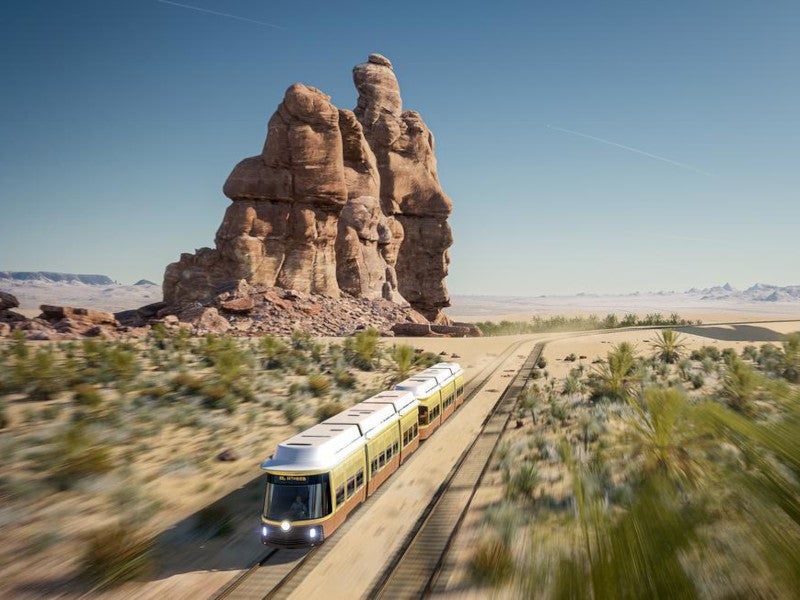The AlUla tramway is an experiential tramway project being developed in AlUla, a historic city in north-west Saudi Arabia. It is poised to be the world’s longest battery-powered, catenary-free tramway line.
Announced in July 2022, the project is being developed by the Royal Commission of AlUla (RCU) in two phases.
The infrastructure work on the 22.4km first phase of the tramway is scheduled to begin in 2024, with operations planned for the latter half of 2027. The tramway is expected to span more than 50km upon completion of both phases.
The innovative project will connect AlUla’s key landmarks, archaeological sites, tourist destinations, and transport hubs providing a unique transit option for residents and tourists. It is designed to enhance the region’s heritage while minimising carbon emissions and aligning historical pathways with cutting-edge, climate-adapted trams.
The project represents a significant step towards sustainable transportation in the region and aligns with global environmental goals and the local commitment to preserving AlUla’s natural and historical landscape.
AlUla tramway project details
The AlUla tramway will follow the route of the historic Hijaz railway line. Phase one will extend from the historic Al Ula Central Hijaz station to the Hegra site in the north.
It will encompass 17 strategically placed stations, with each station serving as a hub for alternative transport services such as personal cycles, e-bikes, on-demand electric vehicles, and other accessible options.
The tramway will provide unparalleled access to the city’s five principal historical districts, including UNESCO World Heritage sites and other culturally significant locations.
The integration of these sites into one transport system aims to enhance the visitor experience enabling them to explore AlUla with ease while preserving the region’s rich heritage.
Some of the UNESCO World Heritage sites that the tramway will connect include AlUla Old Town, the Dadan and Jabal Ikmah archaeological sites, the Nabataean Horizon, and Hegra Historical City.
Rolling stock details
The AlUla tramway will utilise Alstom’s Citadis B battery-powered trams, which are designed to travel at speeds of up to 50km/h. Designed by French design engineers Etienne Tricaud and Patrick Jouin, the trams will resemble the carriages that operated on the Hijaz railway line.
The trams will be fitted with Mitrac B battery solution and incorporate the SRS ground-based static charging system, ensuring efficient and rapid power replenishment.
The modern trams are engineered to be energy-efficient and provide a comfortable ride, featuring large windows, ergonomic interiors, climate control, and real-time passenger information displays.
Accessibility is a priority, with 100% low-floor vehicles and wide doors to facilitate easy boarding and movement within the trams.
The trams will be manufactured across Alstom’s French production sites including La Rochelle.
Contractors involved
SYSTRA, a global consulting and engineering company, signed a contract with RCU to perform detailed design studies for the AlUla tramway in July 2022. The company will perform preliminary and detailed design studies for the tramway’s infrastructure, landscape, architecture, stations, workshop/depot, track, rolling stock, and systems.
SYSTRA is working with other companies, including LABA, ARCHAIOS, ELARD, RGF and ARCOS Engineering for the project.
Alstom, a locomotive manufacturer, signed a $546m contract with RCU to supply 20 state-of-the-art Citadis B battery trams in January 2024. The company will design, integrate, install and test the tram sets and supply signalling and communication equipment.
In addition, Alstom will undertake full maintenance of the project for ten years. The company’s HealthHu tool will be utilised for predictive maintenance and fleet management, aiming for optimal availability.
A joint venture of Setec, Egis and Assystem is providing project management, programme management and construction management services for the overall AlUla County regeneration project including the AlUla tramway.





